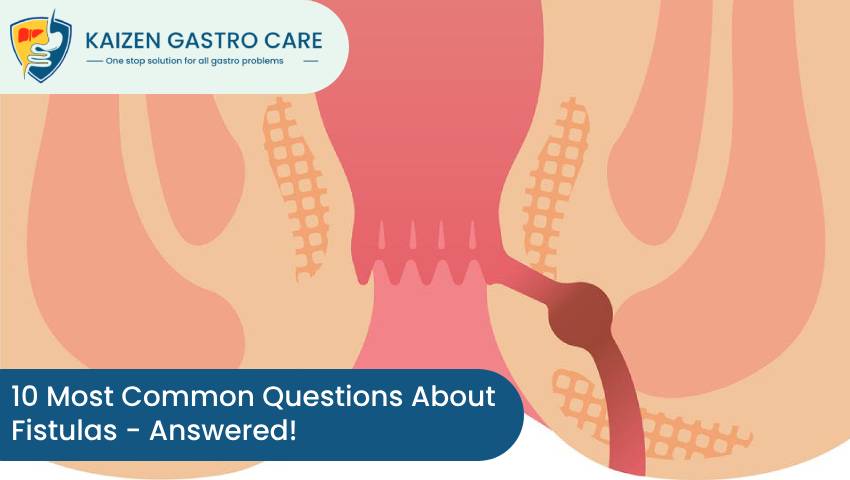
- 30/06/2023
- Kaizen Gastro Care
- 0 Comments
- Proctology
10 Most Common Questions About Fistulas – Answered!
Fistulas are a medical condition that can have a significant impact on a person’s quality of life. While fistulas can occur in various parts of the body, such as the digestive tract, urinary system, or reproductive system, they often cause discomfort, pain, and other complications.
If you have been diagnosed with a fistula, you may have numerous questions about fistulas. Keep reading this blog, we will answer the ten most common questions about fistulas, providing you with valuable information to better understand this condition.
What is a fistula?
A fistula is an abnormal connection or passageway that forms between two organs, vessels, or other structures in the body. It can develop as a result of various factors, such as injury, infection, inflammation, or complications of surgery. Fistulas can occur in different parts of the body, including the digestive tract, urinary system, reproductive organs, and even on the skin.
What causes fistulas?
Fistulas can be caused by various aspects, including:
- Crohn’s disease or ulcerative colitis
- Surgery complications
- Radiation therapy
- Abscesses
- Diverticulitis
- Trauma or Injury
- Colorectal cancer or bladder cancer
- Chronic Medical Conditions
- Congenital Abnormalities
- Chronic diarrhea
- Chronic constipation
- Gynecological Conditions: pelvic inflammatory disease (PID) or complications of childbirth
What are the symptoms of a fistula?
The symptoms of a fistula can vary depending on its location and the organs or structures involved. However, some common symptoms associated with fistulas include:
- Discharge of pus
- Inflammation or swelling
- Pain or discomfort
- Skin irritation or infection around the fistula site
- Change in bowel or urinary habits
- Malnutrition or weight loss
- Diarrhea
- Gas or stool passing through an abnormal opening
- Recurring anal abscess
- Swelling around the anus
How are fistulas diagnosed?
Diagnosing a fistula usually involves a thorough medical history assessment, physical examination, and various tests. Imaging techniques such as CT scans, MRI scans, ultrasounds, or X-rays may be used to locate and determine the extent of the fistula. Additionally, your healthcare provider may suggest blood tests to check for signs of infection or other underlying ailments.
Can fistulas heal on their own?
In some cases, small and uncomplicated fistulas may heal on their own with proper medical treatment, such as antibiotics or medications to decrease inflammation. However, larger or complex fistulas often need medical intervention and surgical treatment to promote healing and prevent further complications.
What are the treatment options for fistulas?
The appropriate treatment for a fistula depends on various factors, including its location, size, and underlying cause. Treatment options may include:
- Medications to control infection or reduce inflammation
- Fistula plugs or sealants to close the abnormal passage
- Seton placement (a surgical thread) to promote drainage and prevent abscess formation
- Surgical repair to close the fistula and restore normal organ function
- Colostomy or ileostomy (in the case of complex or non-repairable fistulas)
Are there any complications associated with fistulas?
Yes, Fistulas can lead to various complications, including infection, abscess formation, malnutrition, electrolyte imbalances, dehydration, and psychological distress due to the impact on daily life and self-image. Prompt diagnosis and treatment can help minimize these complications.
Can fistulas recur after treatment?
The recurrence of fistulas is possible, particularly if the underlying cause is not adequately addressed or if the initial treatment was not successful. Close monitoring and follow-up care are crucial to detect any signs of a recurrence early on and initiate appropriate interventions promptly.
Is a fistula a cancer symptom?
No, a fistula is not a symptom of cancer. However, in some cases, a fistula can develop as a complication of cancer when a tumor erodes through tissues and creates an abnormal connection. But a fistula itself is not a direct symptom of cancer. It is important to consult with a healthcare professional to determine the underlying cause of a fistula and its relationship to cancer, says the best fistula doctor in Pune, Maharashtra.
Can fistulas be prevented?
Preventing fistulas may not always be possible, especially if the underlying cause is a chronic condition or an unforeseen event. However, certain measures can help lower the risk of developing fistulas, such as managing inflammatory bowel diseases, practicing safe sex to prevent sexually transmitted infections, and following proper wound care after surgeries or procedures.
Conclusion:
Fistulas are complicated medical conditions that can significantly impact an individual’s quality of life, but with timely diagnosis, proper treatment, and ongoing support, individuals affected by this condition can manage their symptoms effectively. If you suspect you have a fistula or have any concerns, it is essential to consult with the best fistula specialist & gastroenterologist in Pune, Maharashtra who can guide you through diagnosis, treatment, and ongoing management. Remember, you are not alone, and there is support available to help you through this challenging journey.
